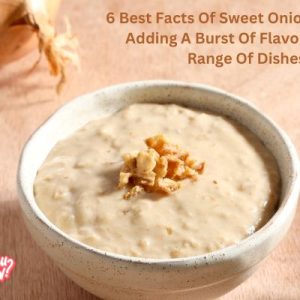Onion powder is a versatile spice that can add depth and flavor to any dish. But did you know that it also has some impressive nutritional benefits? In this article, we’ll explore the importance of onion powder nutrition facts and how they can benefit your health.
Firstly, let’s define what onion powder is. As the name suggests, it is a ground-up version of onion, made by dehydrating and then pulverizing the vegetable. It has a concentrated flavor and aroma, making it a popular ingredient in many different cuisines.
But beyond its culinary uses, onion powder is also a rich source of nutrients. It contains a range of micronutrients such as vitamins C and B6, as well as minerals like iron and potassium. These are essential for maintaining healthy bodily functions, from immune system support to muscle function.
Knowing the nutritional content of onion powder is important, especially if you are looking to maintain a healthy diet. By understanding what’s in this spice, you can make informed choices about your food and ensure that you are getting the nutrients your body needs to thrive. So let’s dive deeper into the nutrition facts of onion powder and explore its health benefits.
The Nutritional Content of Onion Powder

Onion powder is packed with a variety of nutrients that contribute to its impressive health benefits. In this section, we’ll take a closer look at the macronutrients, micronutrients, antioxidants, and phytochemicals found in onion powder.
Macronutrients
Onion powder is a low-calorie food with only 40 calories per 1/4 cup serving. It is also low in fat, with less than 1 gram per serving. However, it does contain carbohydrates and protein, with 9 grams and 1 gram per serving, respectively. These macronutrients are essential for providing energy to the body and supporting muscle growth and repair.
Micronutrients
Onion powder is a rich source of micronutrients, including vitamins C and B6, iron, and potassium. Vitamin C is an important antioxidant that helps protect cells from damage caused by free radicals, while vitamin B6 is vital for maintaining brain function and producing red blood cells. Iron is necessary for producing hemoglobin, which carries oxygen in the blood, and potassium helps regulate blood pressure and fluid balance in the body.
Antioxidants and Phytochemicals
Onion powder also contains a variety of antioxidants and phytochemicals, which are compounds found in plants that have numerous health benefits. One of these compounds is quercetin, a flavonoid that has been shown to have anti-inflammatory properties and may reduce the risk of certain chronic diseases such as heart disease and cancer. Onion powder also contains sulfur compounds, which have antibacterial and antifungal properties and may help boost the immune system.
Overall, onion powder is a nutrient-dense spice that can provide a variety of health benefits. By incorporating it into your diet, you can ensure that you are getting the macronutrients, micronutrients, antioxidants, and phytochemicals your body needs to stay healthy.
Health Benefits of Onion Powder

Onion powder is not only a tasty addition to your meals but also boasts plenty of health benefits. Here are some of the main benefits that onion powder can offer:
Anti-inflammatory Properties
Onion powder contains compounds that have anti-inflammatory properties. These compounds can help to reduce inflammation in the body, which is linked to a range of chronic health conditions, including heart disease, arthritis, and cancer.
Boosts Immunity
Onion powder is also rich in antioxidants, which can help to boost the immune system. Antioxidants protect the body against damage caused by free radicals, which can lead to chronic diseases. By incorporating onion powder into your diet, you can help to strengthen your immune system and protect your body from harmful bacteria and viruses.
Lowers Blood Pressure and Cholesterol Levels
Studies have shown that consuming onion powder regularly can help to lower blood pressure and cholesterol levels. This is because onion powder contains compounds that can help to dilate blood vessels, which can improve blood flow and reduce blood pressure. It also contains compounds that can help to reduce the levels of LDL or “bad” cholesterol in the body, which can reduce the risk of heart disease.
May Prevent Certain Cancers
Onion powder contains compounds that have been shown to have anticancer properties. These compounds can help to prevent the growth and spread of cancer cells, particularly in the stomach and colon. Incorporating onion powder into your diet may help to reduce your risk of developing certain types of cancer.
By knowing the health benefits of onion powder, you can make informed choices about your diet and incorporate this spice into your meals for optimal health benefits.
How to Incorporate Onion Powder into Your Diet

Are you looking to add more onion powder to your meals, but not sure how to use it? Here are some ideas for incorporating this versatile spice into your diet:
Cooking and Seasoning Ideas
Onion powder can be used in a variety of ways to add flavor to your cooking. It works well as a seasoning for meats, vegetables, soups, and stews. You can also sprinkle it on top of salads, roasted nuts, or popcorn for a savory twist.
If you’re feeling adventurous, try mixing onion powder with other spices like garlic, paprika, or cumin to create your own seasoning blends. It’s a great way to experiment with different flavors and customize your meals.
Substitute for Fresh Onion
If you don’t have fresh onions on hand, onion powder can be a convenient substitute. Just keep in mind that it won’t provide the same texture as fresh onion, so it’s best used in recipes where the texture isn’t as important. For example, you can use it in marinades, dressings, or dips to add onion flavor without the crunch.
Precautions for Those with Certain Health Conditions
While onion powder can have many health benefits, it may not be suitable for everyone. Those with certain health conditions, such as irritable bowel syndrome or acid reflux, may find that it exacerbates their symptoms. If you have any concerns, it’s best to speak with your doctor or a registered dietitian before adding onion powder to your diet.
In conclusion, onion powder is a versatile and healthy ingredient that can add flavor and nutrition to your meals. By incorporating it into your cooking and being mindful of any precautions, you can enjoy all the benefits of this tasty spice.
Frequently Asked Questions About Onion Powder Nutrition
Onion powder is a popular spice that is used in many dishes. However, there are some common questions that people have about its nutritional content and health benefits. In this section, we’ll address some of the most frequently asked questions about onion powder nutrition.
Is Onion Powder Healthy?
Yes, onion powder is healthy! As we discussed earlier in this article, onion powder is a rich source of nutrients such as vitamins C and B6, as well as minerals like iron and potassium. It also contains antioxidants and phytochemicals that can help fight inflammation and disease.
Of course, like any food, onion powder should be consumed in moderation as part of a balanced diet. It’s also important to note that some people may be allergic to onions, so if you have any concerns about how onion powder may affect your health, you should consult with your doctor or a registered dietitian.
How Much Onion Powder Should I Use in My Meals?
The amount of onion powder you use in your meals will depend on your personal preference and the recipe you are following. As a general rule of thumb, one teaspoon of onion powder is equivalent to about one medium-sized onion.
However, it’s important to keep in mind that onion powder is more concentrated than fresh onions, so you may need to use less of it in order to achieve the same flavor. Start with a small amount and add more as needed until you achieve the desired taste.
Is There a Difference in Nutrition Between Raw Onion and Onion Powder?
Yes, there is a difference in nutrition between raw onion and onion powder. While both contain many of the same nutrients, onion powder is more concentrated, which means it may contain more nutrients per serving.
However, fresh onions also contain fiber, which is important for digestive health. If you’re looking to incorporate more fiber into your diet, you may want to consider using fresh onions in your meals in addition to onion powder.
Overall, both raw onions and onion powder can be healthy additions to your diet, depending on your individual needs and preferences.
Conclusion
In conclusion, onion powder is a flavorful and nutritious spice that can be a valuable addition to your diet. By understanding its nutritional content and health benefits, you can make informed choices about how to incorporate it into your meals.
From its anti-inflammatory properties to its ability to boost immunity, onion powder has a lot to offer in terms of health benefits. And with its versatility in cooking and seasoning, there are plenty of ways to add it to your favorite dishes.
So next time you’re in the kitchen, consider reaching for some onion powder to add some extra flavor and nutrition to your meals. And remember – for the most reliable and accurate onion powder nutrition facts, turn to onionfacts.com.







